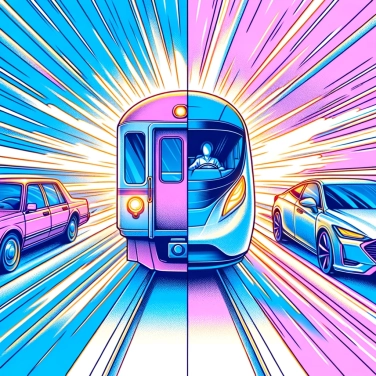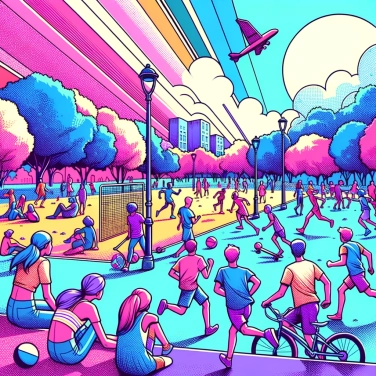The perception of time is altered during a train journey compared to a car journey due to the sense of constancy provided by the train, with its regular movement and the lack of direct control over speed and direction. On the other hand, in a car, the driver is often more involved in the journey, which can make time more tangible and less subjective.

The brain naturally evaluates time based on moving visual cues. In a car, we directly perceive the rapid changes in the scenery along the road, which creates the impression of going faster—and paradoxically makes the journey feel longer psychologically because the brain constantly analyzes new information. Conversely, when traveling by train, the more consistent speed and greater distance from the outside environment diminish this impression. As a result, we perceive rapid visual cues less directly, making the movement smoother and less turbulent for the mind. The outcome is that time seems to flow differently, often faster, during a train journey compared to that experienced in a car.
When you travel by car, the sensory stimulation is strong: the environment changes quickly, landscapes pass continuously, and you actively register visual elements like signs, buildings, people, and vehicles. Your brain remains constantly busy processing these numerous signals, creating a feeling of fast time. In contrast, on a train, your eyes capture a repetitive and monotonous visual image: tracks moving at a steady speed, distant landscapes that are poorly detailed or blurry, and fixed interiors. This greatly limits sensory processing, giving a feeling of stretched or slowed duration. The more visually stimulated you are, the more accelerated your perception of time seems. The less new and varied information you receive, the more time appears to stretch slowly.
The physical comfort you feel directly affects your perception of the passing time. In a car, you generally have limited space, and you're forced to sit almost the entire journey, stuck in the same position; that quickly makes time feel slower and more tedious. In a train, it's different: you can get up, walk a bit, change positions, which makes your body more relaxed and less focused on the waiting. Your brain associates this well-being with a pleasant experience, and time seems to pass more quickly. A comfortable seat, legroom, or the ability to move clearly influences how you perceive the duration of the journey.
By train, you can easily enjoy conversations with the passengers around you, walk around, and even go to the snack car. These opportunities for social interactions help take your mind off things, making the journey seem shorter. In a car, your exchanges are often limited to the people on board, the confined space restricts movement and reduces activity options. Furthermore, when traveling by train, you can watch a movie, work comfortably on your computer, or simply observe others; this choice of available distractions greatly affects the perception of the journey's duration. When driving a car, attention is focused on the road and distractions are limited, making the sense of time feel much more pronounced.
The way we imagine our journey in advance greatly alters our perception of time. If we anticipate a train trip as a pleasant or relaxing moment, it will seem to pass much faster. Conversely, if we view a car ride as an unpleasant or tiring chore, each minute will feel extended. The brain loves to play tricks on us: the more impatient we are to arrive, the longer time stretches. This is the famous effect of "the more you think about it, the longer it feels." This psychological difference between train and car often depends on the context: vacation, regular commute to work, or weekend getaway. Our mood clearly influences our sense of time: happy, relaxed? Time flies. Stressed, frustrated? Time drags. It's as if our brain has its own internal clock depending on its mood and expectations.
Albert Einstein liked to joke about the relativity of time by saying, "Place your hand on a hot stove for a minute, and it will seem like an hour. Sit with a pretty girl for an hour, and it will seem like a minute!" The perception of time depends primarily on lived experience rather than measurable true duration.
Your perception of time can be manipulated by stress levels: when you are anxious or stressed, time seems to pass much more slowly, which is why a journey through traffic jams feels never-ending.
According to certain studies in cognitive psychology, the human brain generally perceives the passage of time as longer when we experience unstimulating or monotonous situations, explaining why a car journey without interactions can seem to last forever.
Visual stimulation strongly contributes to our perception of time. During a train journey, the effect of a panoramic window and varied landscapes could be a potential reason why time seems to pass more quickly.
Yes, frequently checking the time often amplifies our perception of it. By constantly tracking the passage of time minute by minute, we intensely experience the flow of time, which enhances the impression that the journey takes a long time. Therefore, avoiding regular time checks generally allows us to perceive time as being shorter.
Indirectly, yes. Even though we generally do not directly perceive the difference between, for example, 80 and 120 km/h, at high speeds the landscapes pass by quickly and uniformly, reducing distinct visual stimuli. This can create a different perception of the passage of time, giving the impression that the journey is shorter or monotonous.
A comfortable environment offering various activities (such as a dining car, spacious seating, or an internet connection) effectively distracts and occupies our minds. This distraction prevents us from focusing too much on the passage of time; thus, a train journey with comfortable amenities and the freedom to move can seem to pass more quickly than a car trip.
This impression mainly arises from our initial expectations and the way our brain perceives new experiences. The outward journey is often an unfamiliar or uncertain experience, so we pay more attention to the time that has passed, which makes it feel like it stretches. The return journey feels more familiar and predictable, generating less time awareness. As a result, time seems to pass more quickly.
Yes, several studies show that focusing attention on engaging or stimulating tasks, listening to music, or interacting with other people helps divert attention from the passage of time. As a result, the brain reduces its subjective perception of the duration of the journey.

No one has answered this quiz yet, be the first!' :-)
Question 1/5